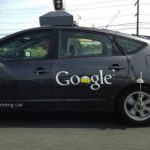Self-driving cars to decrease ownership but increase miles per car
A new study from the University of Michigan Transportation Research Institute, Potential Impact of Self-Driving Vehicles on Household Vehicle Demand and Usage, analyzes the potential of the cars to lower vehicle ownership in households — while car aficionados’ opinions are being considered by AutoBlog.

Image from smoothgroover22.
First, the study: As authors Brandon Schoettle and Michael Sivak report, entirely self-driving cars which include a “return to home” feature and serve as a shared family vehicle can lead to a reduction in car ownership within households. Analyzing data from NHTS’s most recent U.S. National Household Travel Survey, they found a “general lack of trip overlap between drivers within a majority of households,” which means that there’s room for a “significant reduction in average vehicle ownership” among households that adopt car sharing.
The “return to home” feature might work like this: In a two-driver household, Driver 1 needs a car for commuting to work by 8:00 am and returning home at 5:00 pm. Driver 2 needs the car for errands while Driver 1 is at work. With the “return to home” mode, the car would do the following:
- Drop Driver 1 at work.
- Return home for Driver 2 to run errands while Driver 1 is at work.
- Pick up Driver 1 for the commute home.
The reduction could be dramatic: the researchers point out that in the “most extreme” scenario, vehicle sharing like this could drop average car ownership rates by 43%, from 2.1 to 1.2 vehicles per household. Mileage per car may nearly double, as they note, “this shift would result in a 75% increase in individual vehicle usage, from 11,661 to 20,406 annual miles per vehicle.”
While self-driving cars might bode well economically, socially and environmentally, car enthusiasts are not, well, all that enthused. As AutoBlog reports, to many car aficionados “the idea of removing the driver from the driving often sounds like a soulless and grim transportation future.
As Jean Redfield, president and CEO of Next Energy, an energy technology nonprofit, said, “That’s exactly the issue I have a lot of concern about, that our most seasoned decision-makers are informed by the car-enthusiast community,” she said. “That’s not the sustainability market. What the car enthusiast aspires to and gets excited about, and what broader mobility solutions require – and what we need to figure out – are technology roadmaps that make sense.”
But panelists also noted that everyday consumers — who have the most to gain from autonomous vehicles — will likely have more say in years to come than today’s current car enthusiasts. As AutoBlog explains, “Industry leaders may be influenced by a small cadre of enthusiasts now, but panelists predicted that their sway in future products will fade as cities grow and consumers demand efficient mobility more than performance from vehicles that they may share instead of own.” In fact, just last week, two senators pushed NHTSA to “lay the foundation for autonomous vehicle technology.”
Related Posts
Category: Transportation

















